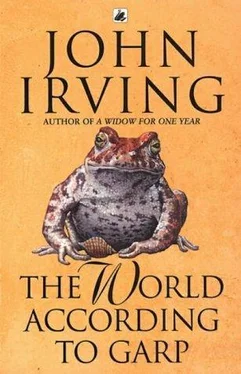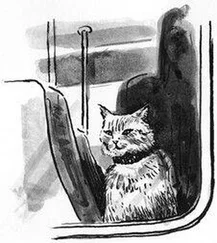The second was M. Neff—"by appointment only.” There was just a phone number after M. Neff's name. No qualifications, or supreme arrogance? Perhaps both. If I needed anybody, Garp thought, I would try M. Neff first. Dr. O. Rothrock with his bank cards and his self-esteem workshop was clearly a charlatan. But M. Neff was serious: M. Neff had a vision, Garp could tell.
Garp wandered a bit past Marriage in the Yellow Pages. He came to Masonry, Maternity Apparel, and Mat Refinishing (only one listing, an out-of-town, Steering phone number: Garp's father-in-law, Ernie Holm, refinished wrestling mats as a slightly profitable hobby. Garp hadn't been thinking about his old coach, he passed over Mat Refinishing to Mattresses without recognizing Ernie's name). Then came Mausoleums and Meat Cutting Equipment—"See Saws.” That was enough. The world was too complicated. Garp wandered back to Marriage.
Then Duncan came home from school. Garp's older son was now ten years old; he was a tall boy with Helen Garp's bony, delicate face and her oval yellow-brown eyes. Helen had skin of a light-oak color and Duncan had her wonderful skin, too. From Garp he had gotten his nervousness, his stubbornness, his moods of black self-pity.
“Dad?” he said. “Can I spend the night at Ralph's? It's very important.”
“What?” Garp said. “No. When?”
“Have you been reading the phone book again?” Duncan asked his father. Whenever Garp read a phone book, Duncan knew, it was like trying to wake him up from a nap. He read the phone book often, for names. Garp got the names of his characters out of the phone book, when his writing was stuck, he read the phone book for more names; he revised the names of his characters over and over again. When Garp traveled, the first thing he looked for in the motel room was the phone book, he usually stole it.
“Dad?” Duncan said—he assumed his father was in his phone book trance, living the lives of his fictional people. Garp had actually forgotten that he had nonfictional business with the phone book today; he had forgotten about the lumber and was thinking only about the audacity of M. Neff and what it would be like to be a marriage counselor. “Dad!” Duncan said. “If I don't call Ralph back before supper, his mother won't let me come over.”
“Ralph?” said Garp. “Ralph isn't here.” Duncan tipped his fine jaw up and rolled his eyes; it was a gesture Helen had, too, and Duncan had her same lovely throat.
“Ralph is at his house,” Duncan said, “and I am at my house and I would like to go spend the night at Ralph's house—with Ralph.”
“Not on a school night,” Garp said.
“It's Friday,” Duncan said. “Jesus.”
“Don't swear, Duncan,” Garp said. “When your mother comes home from work, you can ask her.” He was stalling, he knew; Garp was suspicious of Ralph—worse, he was afraid for Duncan to spend the night at Ralph's house, although Duncan had done it before. Ralph was an older boy whom Garp distrusted; also, Garp didn't like Ralph's mother—she went out in the evening and left the boys alone (Duncan had admitted that). Helen had once referred to Ralph's mother as “slatternly,” a word that had always intrigued Garp (and a look, in women, that had its appeal to him). Ralph's father didn't live at home, so the “slatternly” look of Ralph's mother was enhanced by her status as a woman alone.
“I can't wait for Mom to get home,” Duncan said. “Ralph's mother says she has to know before supper, or I can't come over.” Supper was Garp's responsibility and the idea of it distracted him; he wondered what time it was. Duncan seemed to come home from school at no special time. “Why not ask Ralph to spend the night here?” Garp said. A familiar ploy. Ralph usually spent the night with Duncan, thus sparing Garp his anxiety about the carelessness of Mrs . Ralph (he could never remember Ralph's last name).
“Ralph always spends the night here,” Duncan said. “I want to stay there .” And do what ? Garp wondered. Drink, smoke dope, torture the pets, spy on the sloppy lovemaking of Mrs. Ralph? But Garp knew that Duncan was ten years old and very sane—very careful. The two boys probably enjoyed being alone in a house where Garp wasn't smiling over them, asking them if there was anything they wanted.
“Why not call Mrs. Ralph and ask her if you can wait until your mother comes home before you say whether you'll come or not?” Garp asked.
“Jesus, “ Mrs . Ralph"!” Duncan groaned. “Mom is just going to say, “It's all right with me . Ask your father.” That's what she always says.”
Smart kid, Garp thought. He was trapped. Short of blurting out that he was terrified Mrs. Ralph would kill them all by burning them up in the night when her cigarette, with which she slept, set fire to her hair, Garp had nothing more he could say. “Okay, go ahead,” he said, sulkily. He didn't even know if Ralph's mother smoked. He simply disliked her, on sight, and he suspected Ralph—for no better reason than that the child was older than Duncan and therefore, Garp imagined, capable of corrupting Duncan in terrible ways.
Garp suspected most people to whom his wife and children were drawn; he had an urgent need to protect the few people he loved from what he imagined “everyone else” was like. Poor Mrs. Ralph was not the only victim perhaps slandered by his paranoid assumptions. I should get out more, Garp thought. If I had a job, he thought—a thought he had every day, and rethought every day, since he wasn't writing.
There was almost no job in the world that appealed to Garp, and certainly nothing he was qualified for; he was qualified, he knew, for very little. He could write; when he was writing, he believed he wrote very well. But one reason he thought about getting a job was that he felt he needed to know more about other people; he wanted to get over his distrust of them. A job would at least force him to come into contact—and if he weren't forced to be with other people, Garp would stay home.
It was for his writing, in the beginning, that he had never taken the idea of a job seriously. Now it was for his writing that he was thinking he needed a job. I am running out of people I can imagine, he thought, but perhaps it was really that there had never been many people he liked ; and he hadn't written anything he liked in too many years.
“I'm going now!” Duncan called to him, and Garp stopped dreaming. The boy was wearing a bright orange rucksack on his back; a yellow sleeping bag was rolled and tied under the pack. Garp had chosen them both, for visibility.
“I'll give you a ride,” Garp said, but Duncan rolled his eyes again.
“Mom has the car, Dad,” he said, “and she's still at work.”
Of course; Garp grinned foolishly. Then he saw that Duncan was going to take his bicycle and he called out the door to him. “Why don't you walk , Duncan?”
“Why?” Duncan said, exasperated.
So your spine won't be severed when a car driven by a crazed teenager, or a drunken man suffering a heart attack, swipes you off the street, Garp thought—and your wonderful, warm chest is cracked against the curbstone, your special skull split open when you land on the sidewalk, and some asshole wraps you in an old rug as if you were somebody's pet discovered in the gutter. Then the dolts from the suburbs come out and guess who owns it ("That green and white house on the corner of Elm and Dodge, I think"). Then someone drives you home, rings the bell and says to me, “Uh, sorry"; and pointing to the spillage in the bloody back seat, asks, “Is it yours?” But all Garp said was, “Oh, go ahead, Duncan, take the bike. Just be careful!”
Читать дальше












